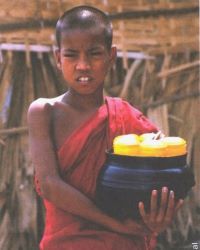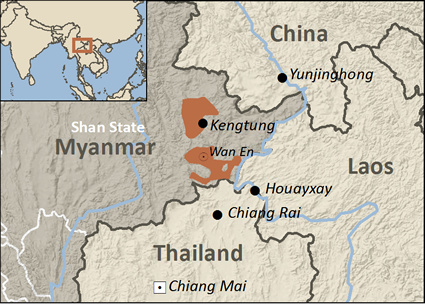The Khun have long been identified as a distinct ethnic group in Myanmar, with the 1931 census returning 31,279 Khun people, all of whom said they were Buddhists except 38 "others." There is some confusion regarding the Khun due to the existence of several unrelated groups in Asia with similar names. They are not related to the Khuen people of Laos and Thailand, who speak a Mon-Khmer language, or to the Kuan tribe of southwest China and Laos.
Location: More than 130,000 people belonging to the Khun ethnic group live in Shan State in northeast Myanmar near the notorious Golden Triangle where Myanmar, Laos, and Thailand meet. The area is characterized by rugged mountains and is hemmed in by the Salween River on its western flank and the Mekong to the east. The Khun in Myanmar are mostly scattered between the ancient walled city of Kengtung to Tachileik on the Thai border. Khun communities are also found in Thailand (7,200 people) and Laos (800), while one source says 10,000 speakers of the Khun language live in Yunnan Province, China.
Language: Several languages including Khun, Northern Thai, and Tai Lue traditionally use the same ancient Tai Tham (Lanna) script from adjacent areas of northern Thailand. Most Khun people can also speak Shan and Burmese. The Tai groups in this part of Asia have many overlapping cultural and linguistic similarities while still preserving their distinct identities. The Khun vernacular, which has five or six tones depending on the location, shares 90 percent lexical similarity with Northern Thai, 92 percent with Tai Lue, and 93 percent with Shan.
Kengtung has been the main center of Khun habitation since a son of the Lanna King Mengrai founded the Kingdom of Kengtung in the 12th century. The Chinese and Siamese (Central Thais) each attempted to take over Kengtung several times during the 18th and 19th centuries, but local armies repelled their efforts. The ancestors of the Khun now living in Thailand were taken there as war captives in the early 1800s.
The Khun are distinguished from other Tai groups in Shan State by “differences in dialect, physical features, and the dresses of their women. The Khun are taller and fairer, and their noses are not so flat.” Most Khun families are engaged in agriculture and fishing, and they conduct trade with the Shan, Lahu, Akha, Wa, and other ethnicities.
Although almost all Khun people are proud Theravada Buddhists, their religious worldview includes strong elements of spirit and ancestor worship. Their “most important spirit is the spirit of the land, which must be propitiated daily with food and beverage at the spirit house found in almost every Khun compound. During the full moon each June, Khun villagers worship their ancestors with offerings of boiled pork, chicken, fruit, rice, and flowers at a special altar inside their houses.”
Approximately 2,000 Khun people are followers of Christ. The first missionary to visit the Khun area was the American Josiah Cushing and his wife, who arrived in Kengtung to great fanfare in November 1869 after traveling overland for five months from Yangon. They were “received with unusual cordiality by the prince and princess…. So friendly was the disposition and conduct of their prince that throngs of people gathered daily at the missionary's house, without fear, to listen to the doctrines of the foreign religion.” Portions of the Bible were translated into Khun in 1938, but they soon fell into disuse. In 1997, leaders of the Christian ministry Asia Harvest met a Khun church leader near Tachileik who presented an old, tattered Bible and begged them to reprint it, as the Khun believers had been without God's Word for generations. The Bible was discovered to be the Tai Lue New Testament of 1933, just 500 of which had been printed in China. Two thousand new copies were printed and distributed in the Khun area, giving a massive boost to the Khun Christian community.”
Scripture Prayers for the Khun in Myanmar (Burma).
| Profile Source: Asia Harvest |


























